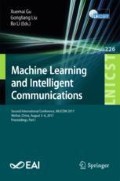Abstract
In sporadic machine-to-machine (M2M) communication, for the Code Division Multiple Access (CDMA) system with random access, applying compressed sensing (CS) algorithms to communication processes is a solution of multi-user detection (MUD). Many papers have shown that compressed sensing multi-user detection (CS-MUD) brings the benefits of jointly detecting activity and data. This paper focuses on the benefits of CS-MUD to the design of spread spectrum code in CDMA systems. Simulations show that CS-MUD brings two advantages in the spread spectrum code design: (1) There exist code sets with short code length can accommodate more users. (2) Code sets design is not limited to the design requirements of pseudo-random sequences, and the CS measurement matrix can be used as the code set. That is, CS-MUD provides a new idea for design and selection of spread spectrum code sets.
Access this chapter
Tax calculation will be finalised at checkout
Purchases are for personal use only
References
Bockelmann, C., Schepker, H.F., Dekorsy, A.: Compressive sensing based multi-user detection for machine-to-machine communication. Trans. Emerg. Telecommun. Technol. 24, 389–400 (2013)
Schepker, H.F., Bockelmann, C., Dekorsy, A.: Coping with CDMA asynchronicity in compressive sensing multi-user detection. In: 2013 IEEE 77th Vehicular Technology Conference (VTC Spring), pp. 1–5. IEEE Press (2013)
Monsees, F., Bockelmann, C., Wubben, D., Dekorsy, A.: Compressed sensing Bayes risk minimization for under-determined systems via sphere detection. In: 2013 IEEE 77th Vehicular Technology Conference (VTC Spring), pp. 1–5. IEEE Press (2013)
Schepker, H.F., Bockelmann, C., Dekorsy, A.: Efficient detectors for joint compressed sensing detection and channel decoding. IEEE Trans. Commun. 63, 2249–2260 (2015)
Bockelmann, C.: Iterative soft interference cancellation for sparse BPSK signals. IEEE Commun. Lett. 19, 855–858 (2015)
Schepker, H.F., Bockelmann, C., Dekorsy, A.: Exploiting sparsity in channel and data estimation for sporadic multi-user communication. In: The Tenth International Symposium on Wireless Communication Systems, pp. 1–5. VDE Press (2013)
Schepker, H.F., Dekorsy, A.: Sparse multi-user detection for CDMA transmission using greedy algorithms. In: 2011 8th International Symposium on Wireless Communication Systems, pp. 291–295. IEEE Press, Aachen (2011)
Abebe, A.T., Kang, C.G.: Compressive sensing-based random access with multiple-sequence spreading for MTC. In: 2015 IEEE Globecom Workshops (GC Workshops), pp. 1–6. IEEE Press (2015)
Candes, E.J., Tao, T.: Decoding by linear programming. IEEE Trans. Inf. Theory 51, 4203–4215 (2005)
Acknowledgments
This work was supported by the National Natural Science Foundation of China (No. 61371100, No. 61501139, No. 61401118).
Author information
Authors and Affiliations
Corresponding author
Editor information
Editors and Affiliations
Rights and permissions
Copyright information
© 2018 ICST Institute for Computer Sciences, Social Informatics and Telecommunications Engineering
About this paper
Cite this paper
Wu, Y., Kang, W., Li, B., Liu, G. (2018). Benefits of Compressed Sensing Multi-user Detection for Spread Spectrum Code Design. In: Gu, X., Liu, G., Li, B. (eds) Machine Learning and Intelligent Communications. MLICOM 2017. Lecture Notes of the Institute for Computer Sciences, Social Informatics and Telecommunications Engineering, vol 226. Springer, Cham. https://doi.org/10.1007/978-3-319-73564-1_69
Download citation
DOI: https://doi.org/10.1007/978-3-319-73564-1_69
Published:
Publisher Name: Springer, Cham
Print ISBN: 978-3-319-73563-4
Online ISBN: 978-3-319-73564-1
eBook Packages: Computer ScienceComputer Science (R0)

